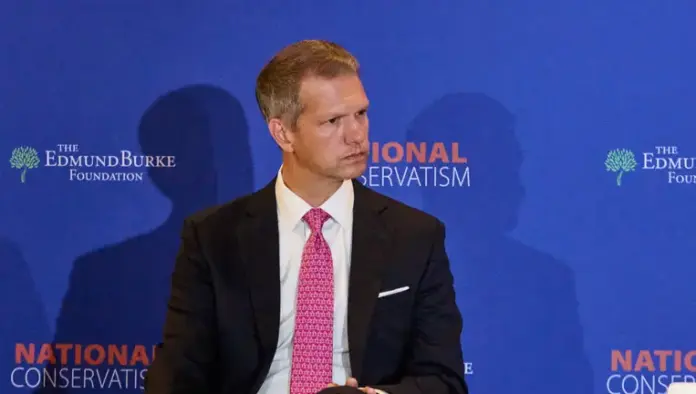United States Congressman Riley Moore has declared that China will not dictate America’s foreign policy or influence its stance on religious persecution in Nigeria, following growing international debate over President Donald Trump’s comments about violence against Christians in Africa’s most populous nation.
Speaking in Washington on Monday, Moore backed Trump’s recent statements condemning what he described as “the persecution and martyrdom of Christians in Nigeria”, saying that the U.S. has a duty to defend religious freedom wherever it is under attack.
“President Trump is absolutely right to defend our brothers and sisters in Christ who are suffering horrific persecution, and even martyrdom, for their faith in our Lord and Savior Jesus Christ,” Moore said. “China will not dictate our foreign policy to us, and we will not be lectured to by a Communist autocracy that recently arrested 30 Christian pastors for their faith and throws ethnic minorities in concentration camps.”
Moore’s statement comes amid heated debate in both Nigeria and the United States over the designation of Nigeria as a “Country of Particular Concern (CPC)” under America’s International Religious Freedom Act.
The designation, which had been discussed by the U.S. government and supported by conservative Christian lawmakers, identifies nations where authorities are accused of allowing or committing serious violations of religious freedom.
President Trump’s renewed focus on Nigeria has attracted both support and criticism. While Christian groups in northern Nigeria and parts of the U.S. have praised the attention, some Nigerian officials and Muslim organizations have accused Washington of misrepresenting Nigeria’s complex security challenges as purely religious.
Representative Riley Moore, a Republican from West Virginia, said Trump’s actions were in line with America’s long-standing commitment to defending religious freedom across the world.
Moore’s comments came after Chinese foreign ministry officials reportedly criticized U.S. politicians for what they called “interference in the internal affairs of other nations”.
China has been strengthening its diplomatic and economic ties with Nigeria and other African countries through major investments and infrastructure loans. Some analysts believe that Beijing views America’s recent religious-freedom campaign as a threat to its growing influence in Africa.
However, the U.S. has continued to stress that its interest in Nigeria is not political but humanitarian. American officials say their concern is to protect vulnerable populations, particularly in areas affected by banditry, insurgency, and ethnic violence.
Relations between Washington and Beijing have been tense for years over trade, technology, and human rights. Moore’s statement adds another layer to that rivalry, showing how Africa — and Nigeria in particular — has become a new stage for the two powers’ competing influence.
Nigeria at the Center of Global Attention
Nigeria has one of the largest Christian and Muslim populations in the world, and religious identity often overlaps with ethnic and regional divisions. The country has faced years of insecurity caused by Boko Haram insurgents, bandit gangs, and farmer-herder clashes, many of which have targeted rural communities in the North and Middle Belt.
While the Nigerian government insists the violence is driven more by criminal and economic factors than religion, many Christian groups disagree. They argue that the pattern of attacks and the lack of justice for victims suggest religious persecution.
In recent years, several international organizations, including Amnesty International and Open Doors International, have documented attacks on Christian villages, churches, and clergy. These reports have fueled growing pressure on Western governments, particularly the U.S., to take a stronger stance.
Reactions to the U.S. debate have been mixed across Nigeria. Some Christian leaders, especially in southern and Middle Belt states, have welcomed Trump’s and Moore’s statements, calling them “long overdue.”
The Southern Kaduna Christian Leaders Association (SKCLA) recently described the U.S. interest as “a moment of truth,” saying that only external pressure might compel Nigerian authorities to confront the scale of persecution in the north.
However, several Muslim leaders and government officials have accused the U.S. of misrepresenting the situation and inflaming divisions. The Federal Government has maintained that it is committed to protecting all citizens regardless of religion and that foreign powers should respect Nigeria’s sovereignty.
While Washington views itself as a defender of global religious liberty, Beijing often accuses the U.S. of using human rights as a political weapon to undermine its rise.
“Nigeria has become a testing ground for competing visions of global leadership,” said a foreign policy expert based in Abuja. “The Americans frame their concern around freedom and human rights, while the Chinese focus on economic partnership and non-interference. Both powers are trying to win hearts and minds.”
Moore concluded his statement by reaffirming America’s commitment to defend Christian communities in Nigeria and elsewhere. He said the United States will continue to support humanitarian efforts and speak out against persecution.
“Our message is clear,” he said. “The United States stands with every man and woman persecuted for their faith. No foreign power — not even China — will stop us from doing what is right.”
As Nigeria continues to navigate internal security challenges, Moore’s comments have once again placed the country at the center of a global discussion on religious freedom, foreign policy, and international influence.
While the full impact of Trump’s and Moore’s statements remains to be seen, one thing is clear: the world’s attention is once again focused on Nigeria’s troubled landscape and the urgent need for peace, justice, and unity among its people.

